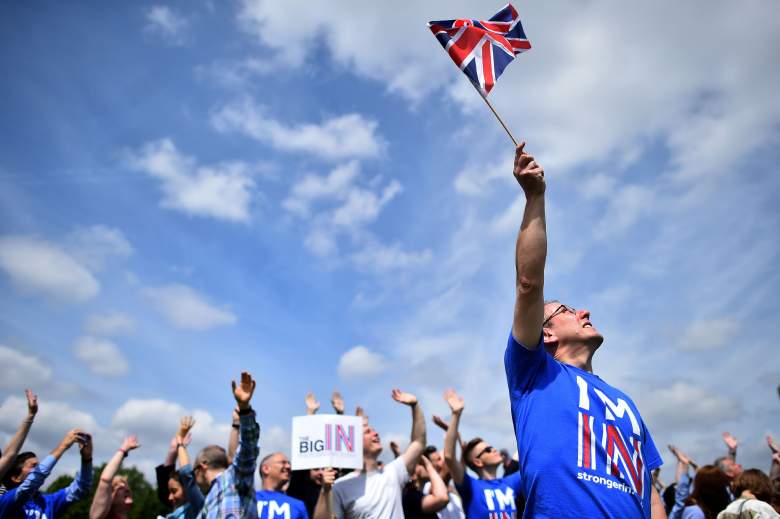
Voters decide June 23 whether they want Britain to leave or remain within the European Union. (Getty)
Tomorrow, the UK will hold a referendum to decide whether it will “Brexit” the European Union, or remain. With just a day away from voting, what are the chances Britain will leave the EU?
Unlike a national election which can provide a somewhat reliable indication of how voters are likely to behave, the last EU Referendum in Britain was more than 40 years ago, and therefore there’s no baseline for making predictions about voter behavior. Based on opinion polling and prediction markets, here’s the state of the referendum:
Telephone & Online Polls: SPLIT
While telephone polls had “remain” leading strongly over “leave” in the months leading up to the referendum, particularly on May 17 when it had a 11.3 percentage advantage, the gap has narrowed significantly. HuffPost Pollster shows that “remain” is only fractionally leading “leave,” 48.5 percent to 48.3 percent.
Internet polls have been mostly split on “remain” or “leave” for the first six months of 2016. A HuffPost Pollster model estimate shows “leave” leading at 46.3 percent to “remain” at 44.3 percent with 7.1 percent undecided.
The Financial Times of London shows similar results in a combined poll: 45 percent to “leave,” 44 percent to “remain,” and 11 percent undecided.
Betting Markets: REMAIN
Aggregated data at PredictWise suggests a high probability of Britain remaining in the EU, with 75 percent chance of “remain” and 25 percent chance of “leave.” Since polling began in April 2016 the highest expectancy for “remain” was 81 percent on May 28, coinciding with the lowest expectancy for “leave” at 19 percent on the same day. The likelihood of “remain” increased significantly in the last week from 62 percent, possibly in relation to the murder of pro-“remain” Labour MP Jo Cox.
Contrasting the static results of telephone and internet polls, betting markets are aggregated from multiple sources (prediction markets, polling) and updated multiple times a day, which may allow for more of a real-time indication of how an election is likely to play out. However, as was evident in the 2015 UK general election, betting markets aren’t always accurate either.
What to Consider
Accounting for differences in how internet and telephone polling is conducted should be considered. Respondents in internet polls are self-selecting while participants in phone polls are chosen (although can decline participation). Internet polls also include a “don’t know” option, whereas participants in phone polls are asked to choose “yes” or “no.” Demographics also play a roll, as younger generations are far more likely to use the internet and thus have access to online polls. Therefore, for both telephone and internet polling, the sample of respondents may not be representative. However, it was concluded that telephone polling is considered to be a more accurate representation of the general public when it comes to determining how participants feel about ‘Brexit.’
What really matters on election day? The demographics of voters who actually turn out to the polls, and whether they will vote as expected or as indicated.
Polls indicate a split along two demographic distinctions: age and social class. While older generations are more likely to vote to leave the EU with younger voters choosing to remain, social standing, particularly education, also holds sway: higher levels of income and education are associated with greater propensity toward remaining in the EU, while voters with lower levels of education are more likely to want to leave.
While “leave” and “remain” are relatively split in the latest poll estimates, it’s also possible that when voters actually go to the polls tomorrow they will err on the side of caution, as was evident in the 2014 Scottish referendum when voters decided whether they wanted to leave the UK and become an independent country. In the week leading up to the vote it appeared as though the ‘no’ vote was ahead of the ‘yes’ vote by four points, but after the results were tallied the lead of 10 points was significantly higher. Whether voters tomorrow will similarly avert risking the unknown and stick to the status quo remains to be seen.
